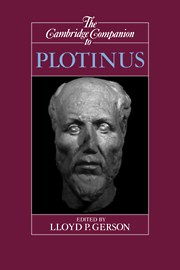Book contents
- Frontmatter
- Introduction
- 1 Plotinus
- 2 Plotinus's metaphysics of the One
- 3 The hierarchical ordering of reality in Plotinus
- 4 On soul and intellect
- 5 Essence and existence in the Enneads
- 6 Plotinus on the nature of physical reality
- 7 Plotinus on matter and evil
- 8 Eternity and time
- 9 Cognition and its object
- 10 Self-knowledge and subjectivity in the Enneads
- 11 Plotinus
- 12 Human freedom in the thought of Plotinus
- 13 An ethic for the late antique sage
- 14 Plotinus and language
- 15 Plotinus and later Platonic philosophers on the causality of the First Principle
- 16 Plotinus and Christian philosophy
- Bibliography
- Index
13 - An ethic for the late antique sage
Published online by Cambridge University Press: 28 May 2006
- Frontmatter
- Introduction
- 1 Plotinus
- 2 Plotinus's metaphysics of the One
- 3 The hierarchical ordering of reality in Plotinus
- 4 On soul and intellect
- 5 Essence and existence in the Enneads
- 6 Plotinus on the nature of physical reality
- 7 Plotinus on matter and evil
- 8 Eternity and time
- 9 Cognition and its object
- 10 Self-knowledge and subjectivity in the Enneads
- 11 Plotinus
- 12 Human freedom in the thought of Plotinus
- 13 An ethic for the late antique sage
- 14 Plotinus and language
- 15 Plotinus and later Platonic philosophers on the causality of the First Principle
- 16 Plotinus and Christian philosophy
- Bibliography
- Index
Summary
“Our concern,” remarks Plotinus, in the course of his treatise On Virtues, which is his chief discussion of the principles of ethics (I.2.6.2-3), “is not to be free of sin, but to be god.” This remark, while not by any means as hybristic as it might appear at first sight, nevertheless points to an important aspect of Plotinus's ethical thought, an aspect which must be addressed at the outset of any discussion of the subject.
To what extent, it must be asked, does Plotinus in fact have an ethical theory? This may seem a silly, even perverse question to ask, but I think we shall see that it has a point. Of course, Plotinus has an ethical stance.
We can derive this from a perusal of Porphyry's Life of Plotinus, and from many remarks scattered throughout his writings. Like most late antique philosophers, especially those of a Platonist or Pythagorean persuasion, he tended to asceticism in his personal life, to celibacy, both heterosexual and homosexual, and even to vegetarianism. 1 He was also, as we learn (Life ch. 9), a kind and caring guardian of orphans, who took his financial and educational responsibilities very seriously and was therefore much in demand in this role. He was also a person of preternaturally powerful psychic powers (ibid. chs. 10-11), which he used for virtuous purposes.
- Type
- Chapter
- Information
- The Cambridge Companion to Plotinus , pp. 315 - 335Publisher: Cambridge University PressPrint publication year: 1996
- 17
- Cited by



